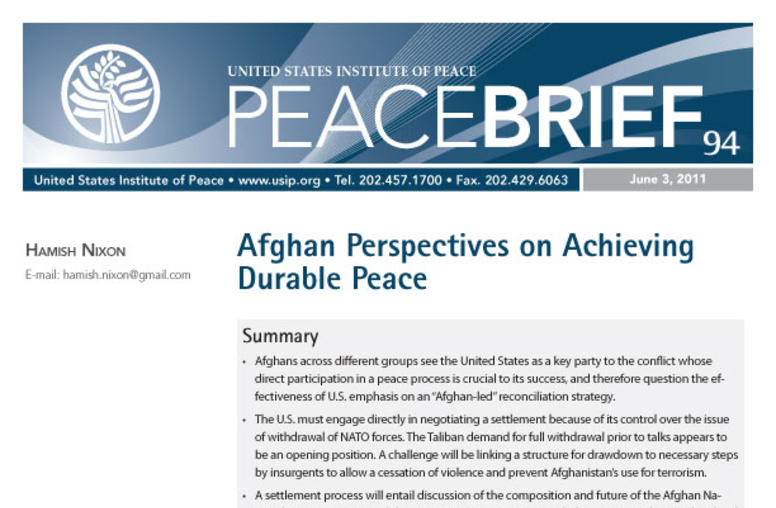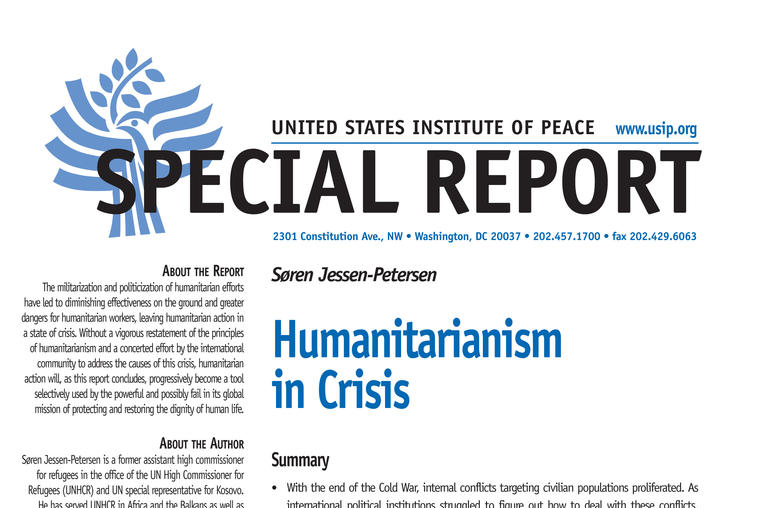Publications
Articles, publications, books, tools and multimedia features from the U.S. Institute of Peace provide the latest news, analysis, research findings, practitioner guides and reports, all related to the conflict zones and issues that are at the center of the Institute’s work to prevent and reduce violent conflict.

Afghan Perspectives on Achieving Durable Peace
This brief outlines key findings from the first phase of research on Afghan stakeholder views on the conflict. The author worked in Afghanistan for the World Bank and the Afghanistan Research and Evaluation Unit from 2005-2010, and has researched governance and peace processes in Southeast Asia, Central America and Afghanistan.
USIP's Afghan Rule of Law at Work: Strengthening Long-Term Security
USIP was among the first organizations to focus on law and justice issues in Afghanistan after the September 11 attacks and the U.S.-led campaign against the Taliban and al-Qaida in 2001. Since 2002, USIP has been studying traditional dispute resolution in the country.

Humanitarianism in Crisis
The militarization and politicization of humanitarian efforts have led to diminishing effectiveness on the ground and greater dangers for humanitarian workers, leaving humanitarian action in a state of crisis.
Strengthening Local Capacities for Dispute Resolution in Afghanistan
Decades of war in Afghanistan have undermined the legitimacy of the government and have decimated the capacity of local conflict resolution and mediation systems. In the absence of functioning state institutions, generations of young people are largely deprived of educational opportunities and meaningful employment prospects. In rural villages, this is exacerbated by the resettlement of refugees and IDPs, causing a rise in the number of conflicts between individuals and communities over acce...
Pakistan 2020
“Pakistan 2020: A Vision for Building a Better Future,” outlines seven core issues Pakistan faces, from developing its rule of law to strengthening health and education, improving internal security and advancing the peace process with India.
After Osama bin Laden: The Future of Pakistan and Afghan Reconciliation
USIP experts discuss how the death of al-Qaida leader Osama bin Laden impacts Pakistan, the prospects for Afghan reconciliation and U.S. policy in the region.
Former National Security Adviser Kissinger on U.S. Exceptionalism
In remarks at the United States Institute of Peace, former National Security Adviser and Secretary of State Henry Kissinger cautioned against suggestions that the United States should embrace a strategy of countering a rising China. Kissinger made keynote remarks at the end of a gathering of USIP’s International Advisory Council at the Institute’s Washington headquarters on May 13.
Afghans Present Complex Reaction to the Death of Osama bin Laden
While the response to the death of Osama bin Laden in the United States was largely euphoric, in Afghanistan, arguably the country most impacted by bin Laden and al-Qaida, the response has been one of concern and caution. In order to parse this response, USIP reached out to a number of our Afghan partners and friends for their response to events of May 1.
Advancing Peace Education in Afghanistan
The war in Afghanistan has had a negative effect on Afghan children, who have been exposed to extreme levels of violence and often see aggression as the primary means to resolve conflict.
Bin Laden: What does it mean for Peace?
USIP’s Special Adviser, Muslim World Initiative Steve Heydemann; Senior Program Officer Col. Paul Hughes; Military Fellow Col. John Maraia; and South Asia Adviser Moeed Yusuf react to Osama bin Laden's death.